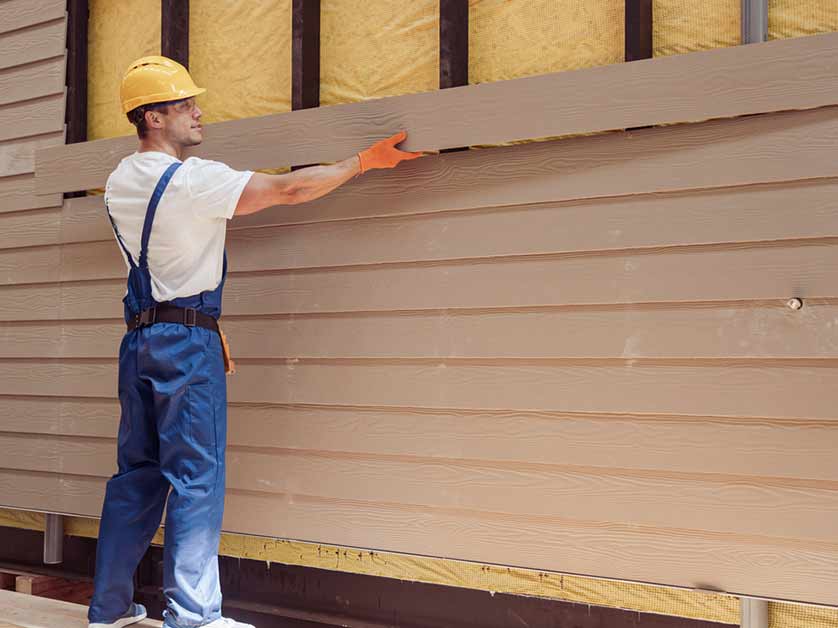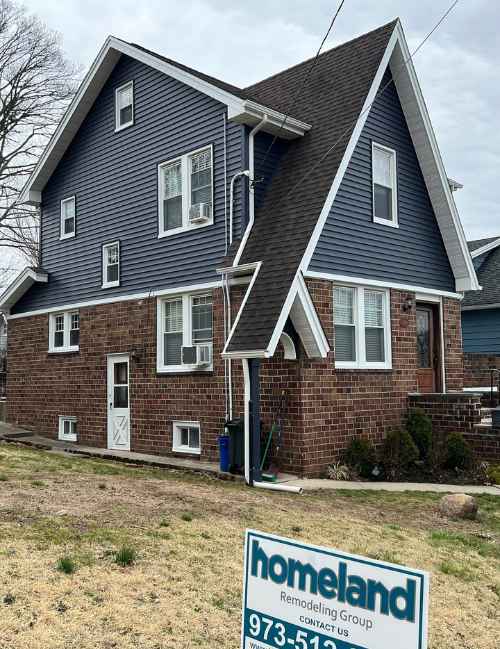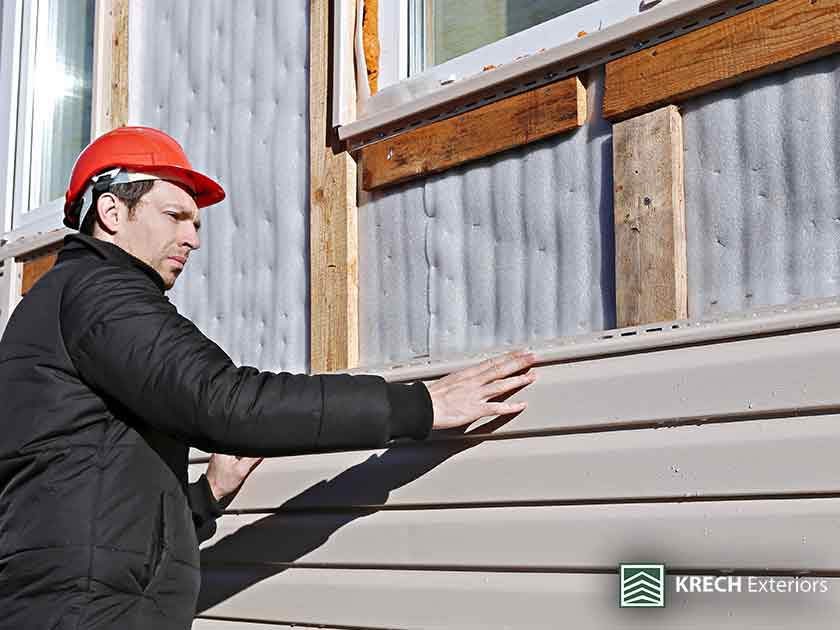The Important Overview to the Different Kinds of Exterior Siding and Their Unique Advantages
In the realm of home enhancement, picking the ideal siding is a crucial decision that affects both visual appeal and functional performance. The selection of materials readily available, such as timber, vinyl, fiber metal, cement, and block, each deal special benefits that cater to various demands and preferences. Comprehending these differences can significantly boost the durability and value of a residential property - morris siding contractor. With so lots of choices to think about, which house siding material really stands out for your particular job? Exploring these options can cause notified decisions that line up with both style and functionality.
Timber House Siding
Timber exterior siding, a prominent selection for residential exteriors, offers a timeless visual that incorporates all-natural charm with structural honesty. This exterior siding material is available in numerous styles, including clapboard, tiles, and board-and-batten, enabling property owners to personalize their façade to match their design preferences. Timber house siding is commonly crafted from sturdy types such as cedar, redwood, or yearn, which are recognized for their durability and ability to hold up against environmental stressors.
Among the primary advantages of wood house siding is its exceptional insulation residential or commercial properties, which can contribute to power effectiveness and reduced heating prices. Additionally, timber home siding is biodegradable, making it an eco friendly alternative when sourced sustainably. Regular upkeep, including paint or discoloration, can prolong its life-span and enhance its appearance, permitting house owners to preserve the natural beauty of the wood.
Nevertheless, possible drawbacks consist of susceptibility to insects, rot, and climate damage, requiring ample therapy and maintenance - morris siding contractor. Regardless of these concerns, when appropriately looked after, wood home siding can give a sturdy and gorgeous option that boosts the personality of a home while offering a warm, inviting environment

Vinyl Exterior Siding
Vinyl home siding has arised as a leading option for homeowners looking for a low-maintenance exterior alternative that integrates sturdiness and affordability. This functional material is crafted from polyvinyl chloride (PVC), making it immune to numerous weather, consisting of moisture and UV rays. Because of this, vinyl house siding does not warp, rot, or discolor, ensuring durable visual charm.
Among the main benefits of plastic exterior siding is its considerable series of shades and designs, enabling homeowners to accomplish the wanted search for their residential or commercial property without the demand for frequent repainting. In addition, plastic exterior siding is very easy to install, which can substantially lower labor expenses throughout construction or restoration tasks.
Vinyl exterior siding likewise adds to power efficiency. Numerous choices function insulation support, which boosts thermal efficiency, helping to preserve comfy interior temperatures and potentially lowering energy expenses. Its smooth surface promotes very easy cleansing, calling for just routine washing with a garden tube to get rid of dust and particles.
Fiber Cement House Siding
Fiber concrete siding has gotten traction among property owners and building contractors alike due to its remarkable mix of durability and site visual convenience. Made up of a combination of cellulose, sand, and cement fibers, this siding alternative is crafted to stand up to extreme weather conditions, consisting of high winds, heavy rain, and temperature variations, making it a long-lasting choice for property additional resources outsides.

Among the main benefits of fiber concrete exterior siding is its resistance to parasites, such as termites, and its non-combustible nature, offering enhanced fire safety and security. morris siding contractor. Furthermore, it is available in a wide range of colors, styles, and appearances, enabling house owners to achieve their preferred visual without sacrificing performance
An additional benefit is its low upkeep demands; fiber concrete siding commonly requires painting or discoloration every 5-10 years, which is much less frequent than other products. Its longevity contributes to a reduced overall cost of ownership, as it minimizes the demand for frequent repairs or replacements.
Ultimately, fiber cement house siding stands for an excellent investment for those seeking a resilient, eye-catching, and versatile outside alternative, incorporating both kind and feature to boost the home's aesthetic charm.
Metal Siding
The allure of metal siding depends on its durable sturdiness and modern-day visual allure, making it a preferred option for contemporary architecture. Available in products such as aluminum and steel, steel home siding supplies a variety of finishes and shades, permitting home owners to attain a tailored appearance that matches their style vision.

Power performance is an additional significant advantage, as numerous metal home siding items are created with insulation alternatives that aid manage indoor temperature levels. This can bring about lowered power prices with time. In addition, steel siding is usually recyclable, making it an environmentally friendly selection for sustainability-minded home owners.
The installment procedure for steel home siding can be relatively straightforward, resulting in a quicker turnaround time for construction tasks. On the whole, steel house siding incorporates performance and design, making it a functional choice for those seeking a long-lasting and aesthetically enticing exterior coating.
Block and Stone Siding
Block and stone siding stands apart as an ageless choice that boosts the visual appeal of any home. Recognized for their longevity and reduced upkeep, these products provide an outstanding return on financial investment while elevating the home's curb allure. Available in various shades, structures, and patterns, brick and rock can be tailored to fit diverse architectural styles, from typical to contemporary.
One of the key advantages of brick and rock siding is their power effectiveness. Both products Full Article have all-natural insulating residential or commercial properties that assist control interior temperatures, potentially lowering cooling and heating expenses. In addition, they offer remarkable fire resistance contrasted to various other siding choices, adding to enhanced security.
An additional advantage is their longevity. Brick and stone can last for decades, commonly needing marginal maintenance beyond occasional cleaning. Unlike wood exterior siding, they are unsusceptible bugs and rot, guaranteeing a durable outside that holds up against the components.
Conclusion
In summary, the selection of siding considerably influences a home's visual allure, power effectiveness, and upkeep demands. Each type of home siding-- whether wood, plastic, fiber steel, concrete, or block and rock-- supplies unique benefits customized to numerous home owner choices and environmental conditions. Comprehending these options enables informed decisions that boost both the resilience and visual beauty of household outsides. Eventually, selecting the appropriate siding is important for attaining an equilibrium between functionality and layout in property design.
One of the primary advantages of wood siding is its excellent insulation buildings, which can contribute to power efficiency and lower home heating costs. Furthermore, timber siding is eco-friendly, making it an environmentally pleasant option when sourced sustainably.One of the main benefits of metal house siding is its resistance to various ecological factors.Energy performance is another considerable benefit, as several metal home siding products are created with insulation alternatives that help control interior temperature levels. Each kind of siding-- whether wood, vinyl, fiber steel, block, or cement and rock-- supplies unique advantages customized to different property owner choices and ecological problems.